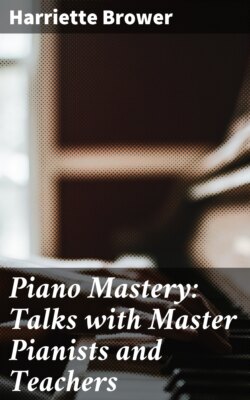Читать книгу Piano Mastery: Talks with Master Pianists and Teachers - Harriette Brower - Страница 22
На сайте Литреса книга снята с продажи.
MIND IN PIANO STUDY
ОглавлениеTable of Contents
Mr. Sigismond Stojowski, the eminent Polish pianist and composer, was found one morning in his New York studio, at work with a gifted pupil. He was willing to relax a little, however, and have a chat on such themes as might prove helpful to both teacher and student.
"You ask me to say something on the most salient points in piano technic; perhaps we should say, the points that are most important to each individual; for no two students are exactly alike, nor do any two see things in precisely the same light. This is really a psychological matter. I believe the subject of psychology is a very necessary study for both teacher and student. We all need to know more about mental processes than we do. I am often asked how to memorize, for instance—or the best means for doing this; another psychological process. I recommend students to read William James' Talks on Psychology; a very helpful book.
"The most vital thing in piano playing is to learn to think. Has it ever occurred to you what infinite pains people will take to avoid thinking? They will repeat a technical illustration hundreds of times it may be, but with little or no thought directed to the performance. Such work is absolutely useless. Perhaps that is a little too strong. With countless repetitions there may at last come to be a little improvement, but it will be very small.
"There is quite a variety of views as to what the essentials of piano technic are; this is a subject on which teachers, unluckily, do not agree. For instance, on the point of finger lifting there is great diversity of opinion. Some believe in raising the fingers very high, others do not. Lifting the fingers high is not good for the tone, though it may be used for velocity playing. I use quite the reverse where I wish beautiful, singing, tone quality. The young pupil, at the beginning, must of course learn to raise fingers and make precise movements; when greater proficiency is reached, many modifications of touch are used. That the best results are not more often obtained in piano teaching and study, is as much the fault of the teacher as the pupil. The latter is usually willing to be shown and anxious to learn. It is for the teacher to correctly diagnose the case and administer the most efficient remedy.
